Keeping you informed
Newsletter May 2021
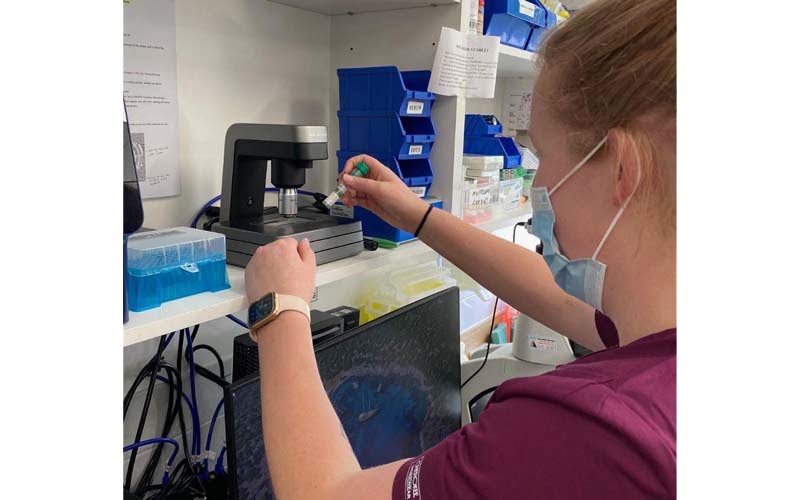
Practice News
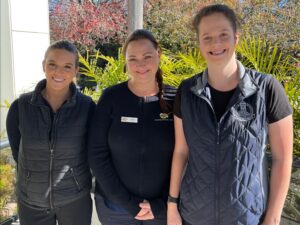 Our team at Turramurra Veterinary Hospital has welcomed some new friendly faces to our customer care team – Amanda and Sienna – and they are really enjoying meeting our local clients and their pets. In addition, we have expanded our nursing team, with Taylor and Sophia, who bring our veterinary nursing care team to a total of 10, to assist our vets and look after the animals in our care.
Our team at Turramurra Veterinary Hospital has welcomed some new friendly faces to our customer care team – Amanda and Sienna – and they are really enjoying meeting our local clients and their pets. In addition, we have expanded our nursing team, with Taylor and Sophia, who bring our veterinary nursing care team to a total of 10, to assist our vets and look after the animals in our care.
Puppy training camps have been incredibly popular, with Katie working individually with puppies from 8 to 16 weeks old, in our puppy training room, focussing on particular areas of behaviour that puppy parents wish to improve. This fast-tracks their training in a positive environment and a training plan can be created for each puppy to concentrate on at home after they are collected. Puppies can be booked in on Tuesdays, Wednesdays and Thursdays each week (drop off anytime from 8am and collection at 12.30pm). Secure a spot for your puppy by calling 9988-0198.
 The recent wet weather has brought on an increased number of gastrointestinal diseases, including diarrhoea, because parasites tend to survive more readily in these conditions. Have a read about our new in-house Imagyst machine below which has the ability to identify these parasites in the blink of an eye when a faecal sample is brought in. Besides parasites, the snails and slugs present a danger to pets too, so read Snail Danger to keep your pet safe.
The recent wet weather has brought on an increased number of gastrointestinal diseases, including diarrhoea, because parasites tend to survive more readily in these conditions. Have a read about our new in-house Imagyst machine below which has the ability to identify these parasites in the blink of an eye when a faecal sample is brought in. Besides parasites, the snails and slugs present a danger to pets too, so read Snail Danger to keep your pet safe.
We welcome your feedback as we strive to improve our services at every opportunity. Please send your important feedback to our dedicated Business Manager, Elyse Staber, at manager@turramurravet.com.au – we really appreciate your opinion.
With warm regards, from your local family-owned Turramurra Veterinary Hospital team.
Snail Danger
Keep your kids and dogs safe
Author: Dr Gretta (Senior Associate Vet)
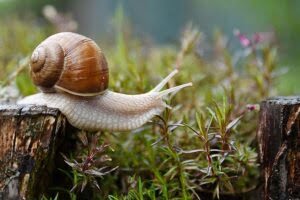
Did you know that it can be dangerous for your dog to eat snails and slugs? In fact, every year at Turramurra Veterinary Hospital, our vets treat at least one case of a nasty disease called angiostrongylosis, which is caused by a parasite found in snails and slugs.
What causes angiostrongylosis?
Snails and slugs act as an intermediate host for the rat lungworm parasite, Angiostrongylosus cantonensis. Snails and slugs eat rat faeces containing the larval worms and then the parasite develops further inside snails and slugs. Rats eat slugs and snails and the parasite then moves from the rat’s intestines and enters the blood stream, then finally some of the parasites enter the central nervous system, including the brain. In rats, the parasite rarely causes any damage to the brain, but if these infected snails or slugs are ingested by another species such as your dog, or even children, the outcome is a lot more serious.
Click here to read the full article on snail danger
5 Ways to help your nervous puppy
Author: Katie (Pet Behaviour Consultant)
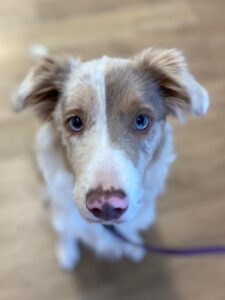 Puppies are usually excitable bundles of fur, but puppies (particularly between 8-16 weeks) are also learning that their world is big and sometimes scary. They are learning that us, their human companions are there to help them through the nervous moments. Here are some ways to help them become that confident adult dog you have dreamed of!
Puppies are usually excitable bundles of fur, but puppies (particularly between 8-16 weeks) are also learning that their world is big and sometimes scary. They are learning that us, their human companions are there to help them through the nervous moments. Here are some ways to help them become that confident adult dog you have dreamed of!
1. Watch for early signs of stress. These include, but are not limited to yawns when not sleepy, shake offs when not wet, lip licks when not anticipating food, scanning, pacing, frozen body posture or pauses. Avoidance and reactivity such as barking are later signs of stress.
Click on the link to learn the other four ways to help your nervous puppy
Pet Of The Month
Author: Rebecca (Clinical Nursing Manager)

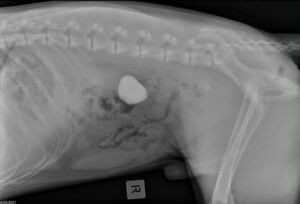
Wonderful Wilbur, (pictured with brother Clancy) recently found himself in a spot of trouble after he decided it was a good idea to eat something he shouldn’t.
Wilbur presented to our wonderful Dr Pip Wines for vomiting, after a thorough examination, it was decided that radiographs were required to see why Mr Wilbur was unwell. Upon inspection of the radiograph it was obvious he had eaten a foreign object.
After emergency surgery, the garden stone was removed and Wilbur was politely lectured on what not to eat!
In true Labrador fashion Wilbur was back to playing with his brother Clancy and eating well very quickly!!
Congratulations Wilbur, pop into the clinic to collect your Pet Of The Month prize pack!
Staff Profile
Getting to know Nurse Madi
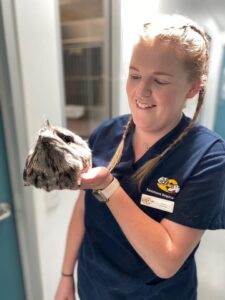 1) What inspired you to become a veterinary nurse?
1) What inspired you to become a veterinary nurse?
I was working as a zoo keeper and became interested in the animal health aspects of zoo keeping. So, after I completed my Certificate III Captive Animals, I decided to go back to TAFE and pursue a Certificate IV Veterinary Nursing. Whilst doing my certificate I realised I found caring for sick animals and nursing back to health very rewarding. I successfully completed my certificate in 2016.
2) Besides small animals, what other animal species do you enjoy working with?
I have been very fortunate to be able to work with a variety of species and even though I am known to love almost every animal I see, from something as big as a water buffalo to as small as sugar gliders. But my favourite animal to work with are the critically endangered sea turtles that are brought into Taronga Wildlife Hospital. To be able to see turtles come into our care so sick and then a couple months later see them recovered and well enough to be released back into the wild is incredible.
3) What do you most enjoy about being a veterinary nurse?
I absolutely love being involved in making a difference to an animals lives. Something as simple as giving them lots of pats, cuddles and treats when they have their first appointments in a new environment, really makes me smile. I am particularly interested in the rehabilitation and care of native wildlife species.
Feline Friends
Ways to Reduce Feline Fear At The Vet
Author: Dr Gretta (Senior Associate Vet)
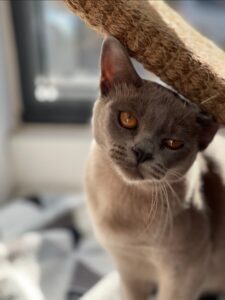 Cats are usually most comfortable in their own environment – at home. So, when it is time to visit the vet, cats can get incredibly stressed but this fear can be reduced by following these 5 steps:
Cats are usually most comfortable in their own environment – at home. So, when it is time to visit the vet, cats can get incredibly stressed but this fear can be reduced by following these 5 steps:
1. Acclimatise your cat to the carrier – Does your cat carrier only get brought out just prior to a visit to the vet? This could create a negative association with getting inside the carrier, so try making the carrier accessible to your cat all the time, and make it into a cosy place to sleep. The aim is to create a feeling of security and positivity around the carrier rather than your cat being afraid of it.
Click on the link to read the full article
Innovations
Introducing our newest innovation, the Imagyst (see lead image).
This addition to our in-house laboratory uses artificial intelligence to detect parasites, including coccidia, giardia and intestinal worm eggs, in your pet’s faeces.
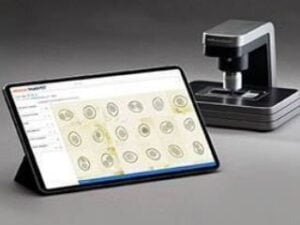 This is particularly important in puppies and kittens that develop diarrhoea or where they have poor body condition. Some of these parasites are life-threatening and so having a screening test which can be run on site within 30 minutes so that treatment can be started immediately if a parasite is found.
This is particularly important in puppies and kittens that develop diarrhoea or where they have poor body condition. Some of these parasites are life-threatening and so having a screening test which can be run on site within 30 minutes so that treatment can be started immediately if a parasite is found.
Turramurra Veterinary Hospital is one of only 3 clinics within NSW currently using this advanced technology. In the past 6 weeks, we have diagnosed over 10 cases of gut parasites in pets, as well as a case of coccidiosis in a kangaroo that was brought in by NSW Parks and Wildlife.
We recommend screening all new puppies for these diseases, some of which are transmissible to humans, so have included a faecal collection kit in our new puppy packs for owners.

